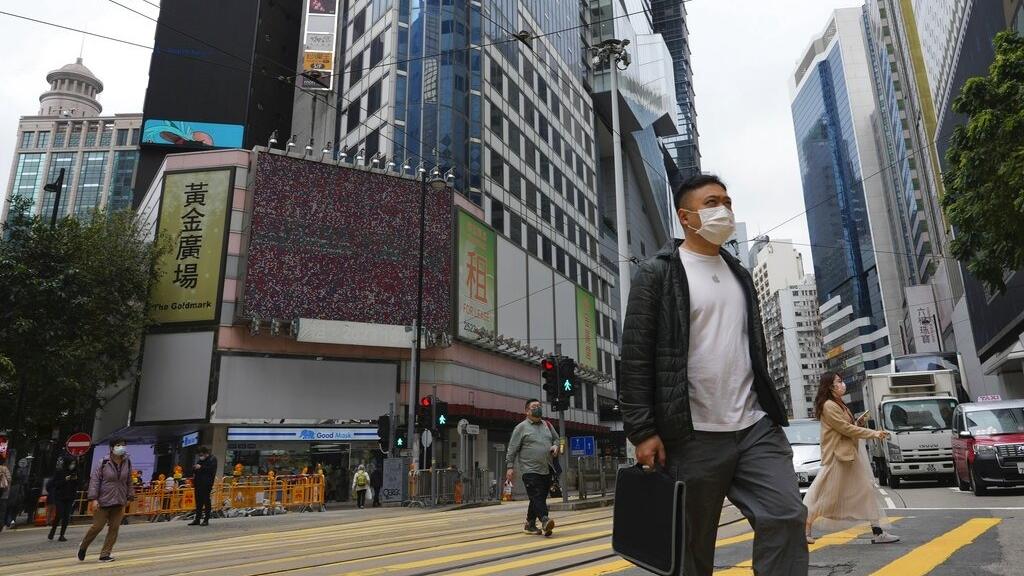 People wearing a face mask walk at a street at Causeway Bay shopping district in Hong Kong, Feb 18, 2022. (VINCENT YU / AP)
People wearing a face mask walk at a street at Causeway Bay shopping district in Hong Kong, Feb 18, 2022. (VINCENT YU / AP)
HONG KONG - A lawmaker from the retail industry segment is pushing for the launch of a seventh round of the Anti-epidemic Fund (AEF) to render more financial assistance to battered retailers and other related sectors.
“The sixth round of the Anti-epidemic Fund does not provide much to help retailers. I think the government should launch the seventh round of Anti-epidemic Fund that can assist retailers financially as soon as possible,” Shiu Ka-fai, a Legislative Council member of the functional constituency of wholesale and retail, told China Daily in an interview.
There should be some types of funds such as the Employment Support Scheme to alleviate the financial burdens of different industries. This is because the pandemic not only affects the retail industry, as other auxiliary industries such as wholesale, import, advertising, media and design are also impacted by the pandemic.
Shiu Ka-fai, HK lawmaker
“There should be some types of funds such as the Employment Support Scheme to alleviate the financial burdens of different industries. This is because the pandemic not only affects the retail industry, as other auxiliary industries such as wholesale, import, advertising, media and design are also impacted by the pandemic,” Shiu argued.
READ MORE: Call for support as HK retail sales see double-digit decrease
The Legislative Council in February approved the sixth round of AEF of HK$27 billion ($3.46 billion), comprising 48 schemes estimated to benefit 67,000 businesses, operators of 40,000 transport tools and 750,000 individuals.
Overall, the relief measures under the sixth-round of the AEF benefit the following four categories: premises that are required to be closed or have their business significantly restricted by the tightening of social distancing measures; businesses that are hard hit by the pandemic and indirectly affected by the tightening of social distancing measures; individuals working in hard-hit businesses and frontline staff who have been making contributions to anti-pandemic efforts; and the short-term/temporarily unemployed.
In addition, other financial programs that can improve the liquidity of retail businesses, such as the 100% Personal Loan Guarantee Scheme and the Pre-approved Principal Payment Holiday Scheme, should continue, Shiu said.
The wholesale and retail segment LegCo member also supported the government’s proposed legislation on a rental enforcement moratorium for tenants from specific sectors, which forbids landlords from terminating leases and from taking legal action against those who fail to pay their rent on time.
ALSO READ: Additional $3.46b for Anti-epidemic Fund approved
“The government legislates to prohibit operators of the 17 scheduled premises from doing business under the legislation relating to the social distancing measures. If the government does not legislate to help alleviate their financial pressures in rent payment, it is not a fair situation,” Shiu argued.
“The proposed legislation will give breathing space to tenants as they have the leverage to bargain for rent cuts with landlords that can prevent business closures,” he added.
In Shiu’s view, landlords are worried that tenants may have a greater tendency to liquidate their businesses when they delay paying rent for a few consecutive months. If tenants really choose to close their businesses, landlords would lose the entire rental income for those consecutive months.
The retail industry is also facing a tough time due to the pandemic. As there is a ban on dining-in at restaurants, foot traffic has been curtailed drastically, seriously affecting business receipts. Retailers are also suffering from a shortage of manpower because many employees or their immediate family members have been quarantined due to COVID infection.
If landlords and tenants reach an agreement on rent reduction, the government’s proposal would permit landlords to collect reduced rents every month. Landlords will be more willing to discuss such an arrangement with tenants, Shiu argued.
The proposed legislation, which would remain in effect for three months, would target specific industries, including the 17 scheduled premises under the Anti-epidemic Fund as well as beleaguered retail outlets and interest-class operators.
ALSO READ:
Concerning the HK$10,000 electronic consumption voucher program, Shiu said the effectiveness of the program depends on the timing of the disbursement.
“If the pandemic is not well contained, Hong Kong residents may not have the mood to spend the voucher for purchasing big-ticket items. They may be more willing to spend the voucher on anti-pandemic goods and daily necessities. Therefore, the expected spill-over effect would be limited as a boost to the retail market,” Shiu cautioned.
The lawmaker expects the retail sales figures for Hong Kong in the first three-months of this year to be very bad, and added that it is not easy for retailers to switch their businesses models entirely to online sales.


